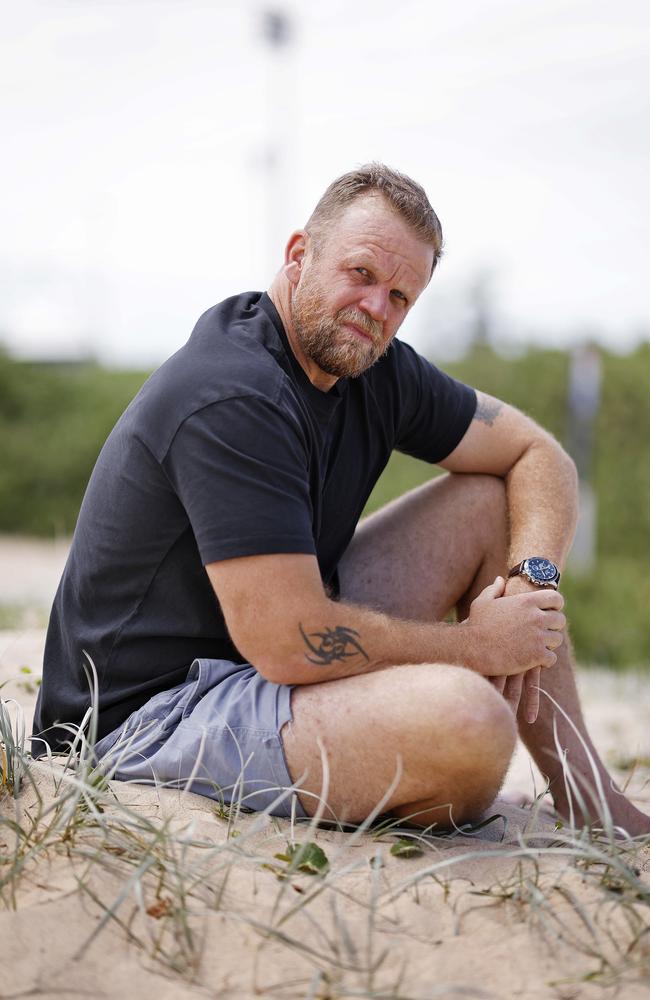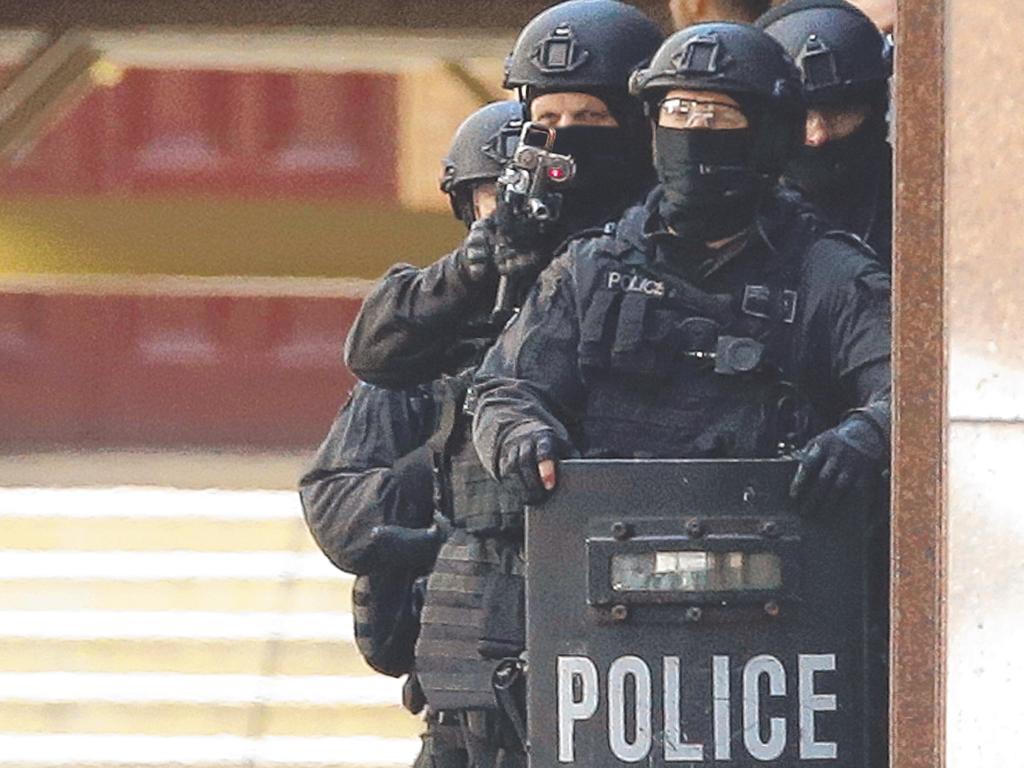Haunting image hero Lindt cop still sees everywhere
The hero cop who shot dead terrorist Man Haron Monis has spoken out after a decade of silence, and he’s demanding a national inquiry into dealing with the trauma of first responders.
The hero cop who shot dead terrorist Man Haron Monis to end the horrifying Lindt Cafe siege 10 years ago is calling for a national inquiry into first responder PTSD.
Ben Besant has gone public with his battle with the crippling mental health condition to spark a national conversation and bring to a head the failures of organisations across the country in their dealings with first responders.
The call to arms has the backing of former NSW premier Mike Baird, who recently revealed his own battle with PTSD following his role co-ordinating the emergency response to the Lindt siege, and former CEO of Beyond Blue and Lifeline Dawn O’Neil.
Mr Besant, a former member of the elite NSW Police Tactical Operations Unit (TOU), shot dead Monis, then carried to safety injured Sydney woman Louisa Hope, 52.
He ran back inside where he found in the bloodied rubble injured barrister Katrina Dawson. Realising she couldn’t be saved, he held her in his arms as she took her last breath.

Mr Besant has never been able to forgive himself for the fact the stray bullet fragments that killed Ms Dawson, 38, likely came from his gun, the debilitating guilt sending him into an emotional darkness.
“I still blame myself to this day. I can’t not,” he said. “At the worst point my symptoms were completely out of control. I’d walk around at work in uniform and my hand would just be on my gun, ready, like hyper vigilant, just out of control.
“I’d see random people as I just walked around the office, I would see them being shot and just bleeding out in front of me.
“Every blonde woman I saw, I completely believed that it was Katrina and I would just panic. I would conceal it but it was literally full blown panic attacks.”

Mr Besant said he was back to work the day after the siege. He described the psychologist sessions provided to him as a “box-ticking exercise” and said him taking time off should have been mandated.
“I admit for me personally, all I wanted was to be around my boys, around the team members who were essentially my support network,” he said.
Mr Baird told The Sunday Telegraph he would support a joint senate inquiry into the tragedy.
“Anything that helps first responders like Ben who have been through events that have had this sort of impact, there is no question, I would support it,” Mr Baird said.
“Too easily big events happen and some of those consequences stay with people for years to come, or the rest of their life.
“These men and women are the forgotten heroes. They were there at our time of need and we need to be there for them ongoing. This sort of initiative is well overdue and hopefully will have a big impact. Ben and others like him deserve our support.”
Ms O’Neil, who currently sits on the international board of Lifeline and has an AM for her work in mental health, said she had no hesitation supporting the call for the senate inquiry and would gladly take part.
“Part of the problem at the moment is that all the jurisdictions have different responses.
“Some of the re-traumatising that occurs is the result of the workers compensation process and that’s different in every state; each jurisdiction handles that differently,” she said.
“I know how powerful a joint senate committee can be, when both sides of parliament can take the time to delve into what the issues are, hear from people who really understand what’s happening on the ground and what’s not working and what is.”
Ms O’Neil said Australia had “shocking suicide rates”.
“We need to really understand the links between trauma and PTSD and how we deal with those traumas and help people through the recovery phase so we can reduce suicides. We need to be better at psychological safety in the workplace,” she said.
Psychologically injured police cost the NSW government more than $180 million in one year alone.
In 2023, 1314 sworn officers resigned or were medically discharged for psychological reasons including PTSD.
Ex-NSW police detective Alana Singleton, who worked with Mr Besant more than 20 years ago in Bankstown and was later diagnosed with PTSD, said she supported his call for a national inquiry.
“I think the important thing is to make sure whatever comes out of such an inquiry is acted upon. It’s no good to hear all these voices and then make recommendations and then do nothing. That’s what has happened in the past and it can’t happen again,” she said.
“This attitude that ‘You weren’t strong enough to do the job’ and organisations always defending their position rather than listening to people with lived experiences really needs to change.”
For Mr Besant, who fought a very public battle to get a suppression order lifted so he could reveal his true identity, the PTSD battle is ongoing.
Once he finally accepted his diagnosis he spent time in a mental health facility and began the journey to recovery.
“That was the second hardest door I have ever had to walk through but I did it for my kids, I did it to try to save my marriage,” he said.
“I still didn’t believe I had PTSD, I needed evidence, I needed the proof to convince myself. And once I convinced myself, I made the decision within myself that I do have it and I needed to beat it.”
He made beating PTSD his next challenge.
“They say to fully train us (TOU officers) it costs over a million bucks so wouldn’t you spend just a bit more money and time making a genuine effort to keep us?” he said.
“But the police force now, it’s just haemorrhaging and I’m sure every copper with PTSD can attest to the fact they don’t take it seriously.
“Cops and paramedics, first responders and the military, we don’t like to admit there’s something wrong with us. We don’t like to admit that we’re not strong enough to deal with it ourselves, which is obviously my story for so many years.
“So a message that I would like to get out there now that I can with my name and my face is that we can’t do it on our own. There are experts out there. There are people using their whole career to help those suffering from PTSD and it’s time everyone got on the same page.”
Editor of Mr Besant’s book Tiger! Tiger! Tiger! Peter O'Neil welcomed the call for a joint senate inquiry.
“This is a chance for our Prime Minister to leave his mark and at the same time meet a real need: to keep first responders well and in work so that they can protect and serve as they are trained to do,” he said.
Originally published as Haunting image hero Lindt cop still sees everywhere




